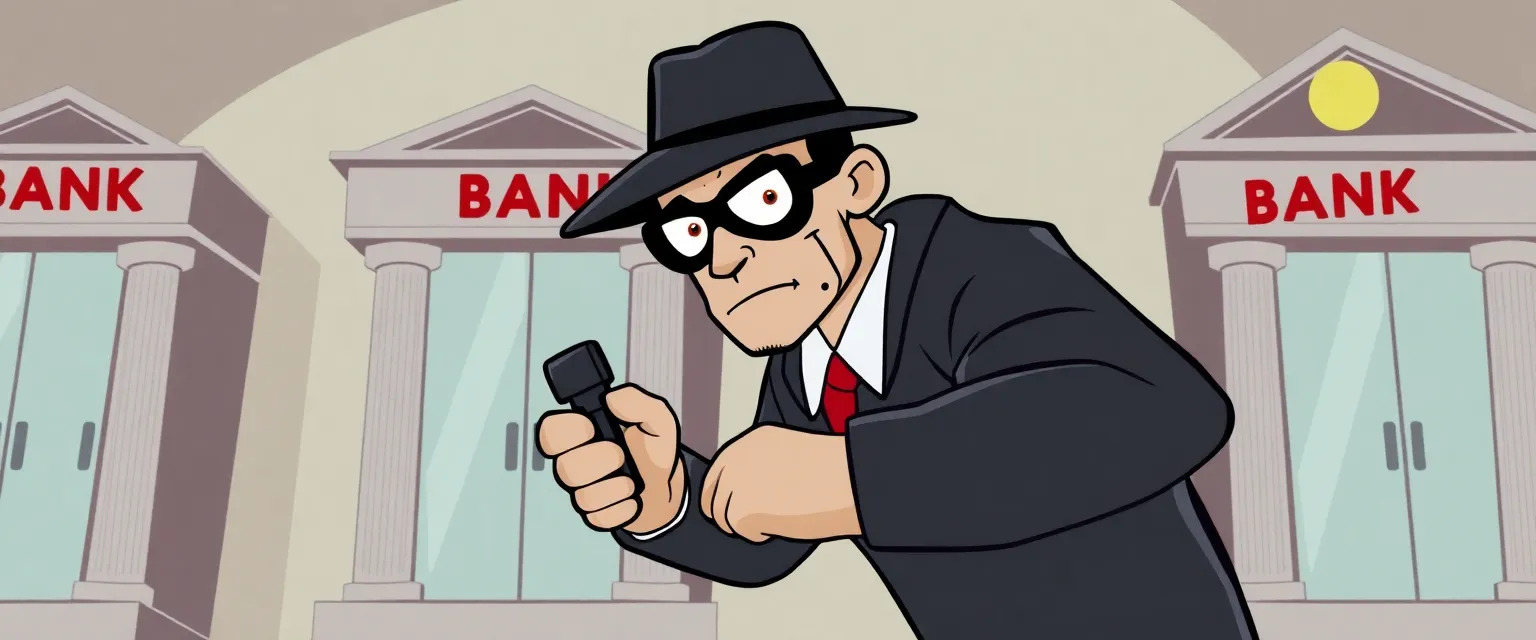The One More Paradox: How Many Bank Heists Should You Do?
When planning a life of crime (hypothetically, of course), a critical question arises: how many bank heists should you commit before calling it quits? One heist might leave you short of a comfortable retirement, while pushing your luck with 50 might land you in jail faster than you can say "stick 'em up."
This question of optimizing your crime spree involves weighing risk against reward—a classic problem of expected utility. Let’s dive into the math of heist planning to uncover how many bank jobs make sense, purely as a thought experiment.
Modeling the Decision
To keep things simple, here are the ground rules of our hypothetical scenario:
- Each successful bank heist earns you $1 million.
- The chance of getting caught in any single heist is 20%.
- If you get caught, you lose all your earnings and your freedom, which you value at $1 million.
- If you manage to pull off multiple heists without getting caught, your net worth grows with each success.
Your goal? Maximize your expected utility, a measure of the risk-weighted payoff.
The Math Behind the Paradox
The table below breaks down the math. For each number of heists, we calculate:
- Probability of freedom: The chance of getting away with all heists.
- Utility in freedom: Total earnings from successful heists.
- Expected utility: The product of the probability of freedom and utility in freedom.
| Amount Bank Heists | Probability of Freedom | Utility in Freedom | Expected Utility (Probability in Freedom * Utility in Freedom) |
|---|---|---|---|
| 0 | 1.0000 | 1,000,000 | 1,000,000.0 |
| 1 | 0.8000 | 2,000,000 | 1,600,000.0 |
| 2 | 0.6400 | 3,000,000 | 1,920,000.0 |
| 3 | 0.5120 | 4,000,000 | 2,048,000.0 |
| 4 | 0.4096 | 5,000,000 | 2,048,000.0 |
| 5 | 0.3277 | 6,000,000 | 1,966,200.0 |
| 6 | 0.2621 | 7,000,000 | 1,834,700.0 |
| 7 | 0.2097 | 8,000,000 | 1,677,600.0 |
| 8 | 0.1678 | 9,000,000 | 1,510,200.0 |
| 9 | 0.1342 | 10,000,000 | 1,342,000.0 |
| 10 | 0.1074 | 11,000,000 | 1,181,400.0 |
| 11 | 0.0859 | 12,000,000 | 1,030,800.0 |
| 12 | 0.0687 | 13,000,000 | 893,100.0 |
| 13 | 0.0550 | 14,000,000 | 770,000.0 |
| 14 | 0.0440 | 15,000,000 | 660,000.0 |
| 15 | 0.0352 | 16,000,000 | 563,200.0 |
| 16 | 0.0281 | 17,000,000 | 477,700.0 |
| 17 | 0.0225 | 18,000,000 | 405,000.0 |
| 18 | 0.0180 | 19,000,000 | 342,000.0 |
| 19 | 0.0144 | 20,000,000 | 288,000.0 |
| 20 | 0.0115 | 21,000,000 | 241,500.0 |
Finding the Sweet Spot
From the table, we can see a clear trend:
- Your expected utility increases with each heist, up to the third or fourth heist.
- After the fourth heist, the risk of getting caught outweighs the potential reward. Beyond this point, your expected utility starts to decline.
So, the optimal number of bank heists to maximize your expected utility is between three and four.
The “One More Paradox”
Why does this happen?
At the start of your career, the odds are in your favor. A single heist is worth the risk because you have a high chance of gaining one more million. However, as you accumulate more loot, the value of adding another million diminishes compared to the growing probability of losing everything.
This creates the "one more paradox": the temptation to attempt just one more heist often leads to disaster. Rationally, you should stop after your fourth heist. Emotionally, many would push their luck—and pay the price.
Disclaimer
While this analysis is fun and illuminating, it comes with a crucial caveat: don’t rob banks. From a purely mathematical perspective, even a single bank heist is suboptimal. In modern times, the success rate for high-stakes crime has plummeted thanks to surveillance, advanced forensics, and strict security measures.
In short, the truly optimal number of bank heists is zero.
Final Thoughts
The "one more paradox" is not just limited to hypothetical bank robberies. It applies to many real-life scenarios, from gambling to investment strategies. Knowing when to stop—when the risks outweigh the rewards—is a critical skill in game theory and life.
So, next time you’re tempted to push your luck, ask yourself: is “one more” really worth it? Chances are, the answer is no.
Disclaimer: This article is purely for entertainment and educational purposes. Always follow the law.
